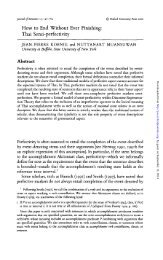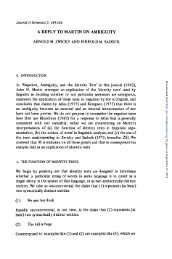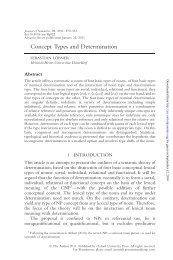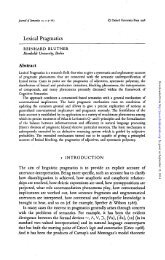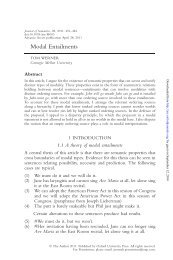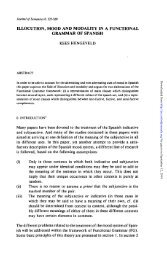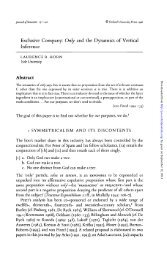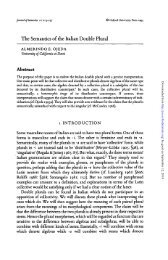Aspectual Coercion and Logical Polysemy - Journal of Semantics
Aspectual Coercion and Logical Polysemy - Journal of Semantics
Aspectual Coercion and Logical Polysemy - Journal of Semantics
Create successful ePaper yourself
Turn your PDF publications into a flip-book with our unique Google optimized e-Paper software.
134 <strong>Aspectual</strong> <strong>Coercion</strong> <strong>and</strong> <strong>Logical</strong> <strong>Polysemy</strong><br />
constraints on type coercion in complement constructions <strong>of</strong> aspectual<br />
predicates in English <strong>and</strong> French. What we discover is a natural explanation for<br />
the behavior <strong>of</strong> coercion that makes reference to different types <strong>of</strong> event<br />
selection while also addressing the polysemous nature <strong>of</strong> aspectual verbs.<br />
We will assume some general familiarity with the framework <strong>of</strong> a generative<br />
lexicon (GL), as outlined in Pustejovsky (1991a, 1993), <strong>and</strong> Copestake (1993).<br />
We feel it is important, however, to clarify the motivating principles <strong>and</strong><br />
general methodology behind this work, since it is crucial to the analysis taken in<br />
this paper. The empirical study <strong>of</strong> the range <strong>and</strong> limits <strong>of</strong> type change <strong>and</strong> cocomposition<br />
operations in natural language is an essential part <strong>of</strong> research in<br />
formal semantics. The advantages accompanying generative mechanisms <strong>and</strong><br />
the characterization <strong>of</strong> languages as polymorphic in well-defined ways allow us<br />
to overcome the explanatory inadequacies inherent in traditional approaches to<br />
lexical design <strong>and</strong> semantic projection, what Pustejovsky & Boguraev (1993)<br />
call word sense enumeration approaches.<br />
In order to help characterize the generative power <strong>of</strong> natural languages in<br />
terms <strong>of</strong> semantic expressiveness, it is natural to think in terms <strong>of</strong> semantic<br />
systems with increasing functional power. Furthermore, a natural way <strong>of</strong><br />
capturing this might be in terms <strong>of</strong> the type system which the grammar refers<br />
to for its interpretation. There are reasons for describing semantic systems as<br />
falling on a hierarchy <strong>of</strong> increasing expressive power <strong>and</strong> it seems clear at this<br />
point that the current enumerative techniques for lexical description are too<br />
impoverished adequately to describe the richness<strong>of</strong> semantic data, much less to<br />
explain either how word senses relate to one another or the creative use <strong>of</strong><br />
words in novel contexts.<br />
A generative lexicon <strong>of</strong> the type we assume can be characterized as a system<br />
involving at least the following four levels <strong>of</strong> representations:<br />
1. Argument structure: Specification <strong>of</strong> number <strong>and</strong> type <strong>of</strong> logical<br />
arguments.<br />
2. Event structure: Definition <strong>of</strong> the event type <strong>of</strong> a lexical item or phrase.<br />
Sorts include STATE, PROCESS, <strong>and</strong> TRANSITION.<br />
3. Qualia structure: Composed <strong>of</strong> FORMAL, CONSTITUTIVE, TELIC <strong>and</strong> AGENTIVE<br />
roles. 2<br />
4. Lexical inheritance structure: Identification <strong>of</strong> how a lexical structure is<br />
related to other structures in the type lattice.<br />
A set <strong>of</strong> generative devices connects these four levels, providing for the<br />
compositional interpretation <strong>of</strong> words in context. The exact nature <strong>of</strong> these<br />
devices will determine the polymorphic expressiveness <strong>of</strong> the semantics in<br />
fairly definite ways. The best-studied illustration <strong>of</strong> this is the phenomenon <strong>of</strong><br />
type coercion, but it is by no means the only one.<br />
Copestake & Briscoe (1992) model the mechanisms <strong>of</strong> generative lexicon<br />
Downloaded from http://jos.oxfordjournals.org/ by guest on September 12, 2014



